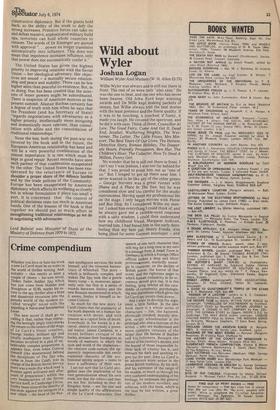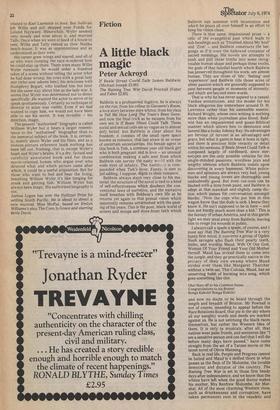Wild about Wyler
Joshua Logan
William Wyler Axel Madsen (W. H. Allen £3.75) Willie Wyler was always and is still out there in front. The rest of us were only "also rans." He was the one to beat, and the one who has never been beaten. Old John Ford kept winning awards and De Mille kept making packets of money, but Willie always told the best stories with the least pretence and the finest quality. If it was to be touching, it touched; if funny, it made you laugh. He covered the spectrum, and he did it with ease. Think of them: Councillor At Law, The Good Fairy, Come And Get It, Dead End, Jezabel, Wuthering Heights, The Westerner, The Letter, The Little Foxes, Mrs Minever, The Best Years Of Our Lives, The Heiress, Detective Story, Roman Holiday, The Desperate Hours, Friendly Persuasion, Ben Hur, The Children's Hour, The Co/lector, How To Steal A Million, Funny Girl.
No wonder that he is still out there in front. I can't say I was jealous, I was too far behind for that. I was proud to point him out as "one of us." But I longed to get up there near him. I never wanted to be like any of the other greats — George Stevens was a great runner with Shane and A Place In The Sun, but he was considered slow and too careful for the studio metronomes. Having spent my professional life on the stage, I only began movies with Picnic and Bus Stop. So I considered Willie my mentor. I asked him everything I could think of, and he always gave me a twinkle-eyed response with a salty wisdom. I could then understand how my childhood friend, Margaret Sullivan, married him. I had hated him in the early days, feeling that my best pal, Henry Fonda, was being jilted for some German interloper — and related to Karl Laemmle to boot. But Sullivan left Willie and still skipped over Fonda for Leland Hayward. Meanwhile, Wyler seemed very steady and wise about it, and married Tally. Once when we were in need of a house to rent, Willie and Tally rented us their Malibu beach-house. It was as unpretentious and as undecorated as they were.
His career grew wings and soared, and all of us who were running the race wondered how he could stay up there. There were many Willie Wyler rumours: he would order a hundred takes of a scene without telling the actor what he had done wrong; his rows with a great lady star (who now adores him); his strictness with Humphrey Bogart, who loathed him but later felt the same way about him as the lady star. It seems that Wyler was determined not to direct specifically. ,He wanted the actor to move or to speak spontaneously. Certainly no technique of director to actor was visible. Even if we had wanted to copy him, we would not have been able to see his secret. It was invisible — his direction, magic.
The present "authorised" biography is called William Wyler but it bears a larger resemblance to the "authorised" biographer than to the immortal subject of the book. It is, certainly, mainly about Wyler and his films, and as a motion-picture reference .book nothing has been left out. Nothing, that is, except Wyler's heart and Wyler's brains. It's a dry, factual and carefully annotated book and for those movie-oriented homes who argue over who directed what and which picture came after which, it could be a useful acquisition. But for those who want to feel and hear the living, breathing William Wyler it's like longing for steak and getting fish. William Wyler has always been magic: His authorised biography is not.
Joshua Logan has won the Pullitzer Prize for writing South Pacific. He is about to direct a new musical, Miss Moffat, based on Emlyn Williams's play The Corn Is Green and starring Bette Davis.



































 Previous page
Previous page